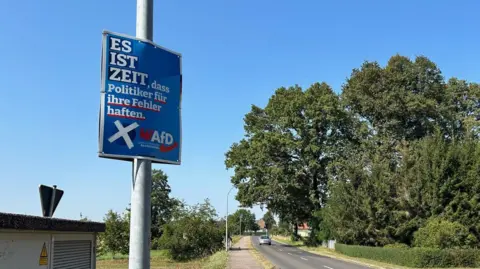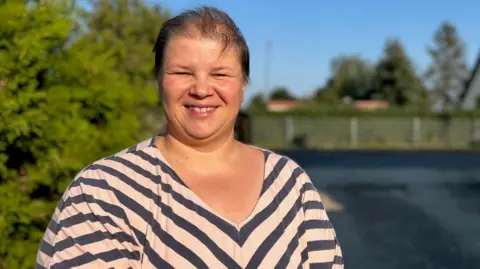Rise of far right in Germany’s east isn’t over yet
“If the old parties had done their jobs properly then the AfD would not exist,” Ingolf complains, echoing a common sense that the rest of Germany looks down on so-called “Ossis” in the east.
Far-right Alternative for Germany (AfD) have already won the most votes in regional elections this month in the eastern state of Thuringia. Now Germany’s bracing for a further political shockwave, as polls suggest the AfD could also take the most votes in Brandenburg state’s election in a few weeks time.
Tucked away near the Polish border, in the two tiny villages of Jämlitz and Klein Düben, support for the far right has soared.
A former conservative (CDU) voter, Ingolf is frustrated about how successive governments have handled education, saying standards were better when he was a boy growing up in the communist German Democratic Republic.
He voices anxiety about Germany’s flatlining economy as well as immigration, comparing the far-right riots in England this summer to “civil war-like conditions”.
Disorder that, while nothing like a civil war, has stoked narratives about the potential for violent clashes within multicultural communities.
“That’s not what we want here in Germany,” he says.

In Jämlitz, most notable for a large goose farm, the idea of civil strife couldn’t feel further away.
Nor could the war raging in Ukraine. But the AfD’s call to stop sending weapons to Kyiv is also resonating strongly.
“The money for Ukraine is an issue,” says Yvonne, who sees all war as “senseless” as we chat to her just down the road.
“And this is our tax money that is sent abroad. We have enough things to fix in our own country.”
However, Yvonne is leaning towards another anti-establishment party launched only this year that also opposes supplying arms to Ukraine and which is a surging force in German politics: the Sahra Wagenknecht Alliance (BSW).
Ms Wagenknecht’s personal brand of “left-wing conservatism” has already propelled her party this month into the potential role of kingmaker in Saxony and Thuringia.
However, for her critics, she has simply fashioned another unwelcome populist, pro-Putin movement that’s actively undermining central pillars of German foreign policy.
I challenge Yvonne about the idea of ending arms supplies to Ukraine, which could help Russia win a war it began, by invading its neighbour.
“I can understand both sides,” she says after a little hesitation.

This is the part of Germany where the older generation, from the GDR years, grew up learning Russian language and culture.
It’s also a country, scarred by two World Wars, that retains a strong pacifist streak fed by fears the existing conflict could escalate.
“Poland is not big,” Yvonne says, as she points out the Polish border is only a few miles away. “And we are then the first ones to go when the tanks come across.”
In these two villages, that have a population of under 500 people, 57.5% of voters backed the far-right party in a recent local council election, the largest proportion in Brandenburg.
Across the wider district, that number was 43.7%, also unusually high.
It comes ahead of a larger, state-parliament level vote on 22 September, where the AfD is leading the polls – after they already won the most votes in Thuringia and came a close second in Saxony on 1 September.
In Thuringia, the AfD attracted 36% of the under-30s vote, say election researchers.
Their relative strength in the east is despite the fact the party is viewed by many – and officially classed in three states – as right-wing extremist, a charge its supporters avidly reject.
Not far away, I visit one of the beautiful lakes that have been transformed from their original purpose as open cast coal mines.
As I wander around asking people if they want to talk about German politics, most, perhaps unsurprisingly, are not all that tempted.
A woman called Katrin does agree to speak, although she doesn’t want her picture taken.
Ushering us away from a small crowd sunbathing on the grass and a little beach, she lights a cigarette and is watchful as we wait to hear what she has to say.
It feels like it’s going to be really controversial.
 Getty Images
Getty ImagesShe doesn’t like the AfD – something that can feel like a rogue opinion around here.
“Half the people here didn’t vote for the AfD,” she reminds us, adding she is “devastated” by local levels of support for a far-right party.
But why are they so popular, I ask?
“That’s a good question,” says Katrin. “That’s what I ask myself all the time.”
“There is an old saying,” she recalls. “If a donkey is too comfortable it goes on black ice.”
Katrin is saying that she believes life, actually, is relatively good for people in the community, leading to a misguided “grass-is-greener” syndrome – whether that’s with an eye on the past or present.
Average wage levels and household wealth are lower in the east when compared to the west, although inequalities have narrowed through the years.
Overall, Katrin doesn’t understand it. “I’m still thinking myself, why, why, why?”
You get the feeling that mainstream parties, including those in Chancellor Olaf Scholz’s coalition government, are similarly unable to quite comprehend, or respond, to the success of either the AfD or BSW, parties polling nationally at about 18% and 8% respectively.
The traditional parties of power are casting a nervous eye to the east and the Germany’s reputation for relatively calm, consensus politics is under strain.



